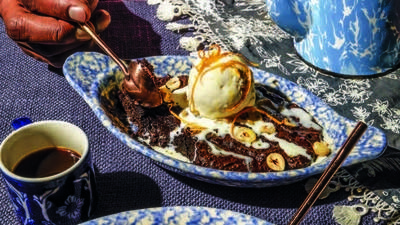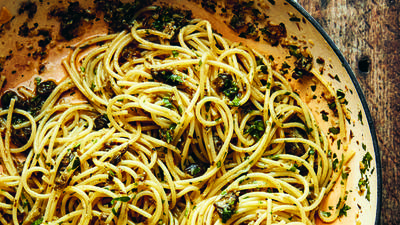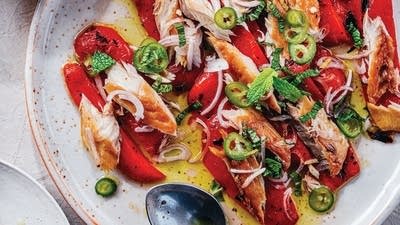
There’s no question that as new immigrants come here, we are intrigued by their food. There is status in discovering the first Peruvian restaurant in town.
But often there is an assumption that newcomers want to learn about how to live from us instead of us learning from them. International journalist Claudia Kolker has another take -- she lays it out in her book, The Immigrant Advantage: What We Can Learn from Newcomers to America about Health, Happiness, and Hope.
Lynne Rossetto Kasper: In your book, you talk about different aspects of immigrant life: saving money, courting, families socializing and living together. One of the most intriguing concepts is called monthly rice, which comes out of the Vietnamese community.
 Claudia Kolker (Michael Stravato)
Claudia Kolker (Michael Stravato)
Claudia Kolker: The basic idea is subscribing to meals that traditionally are delivered to your house. You can subscribe on a monthly basis. They are cheap, homemade, and composed of the freshest, least-expensive things from the market that day. They are for working families who still intensely value eating together -- even if it’s 9 p.m. -- and eating real food.
LRK: What’s the difference between this and setting up something with a restaurant?
CK: Or take out?
LRK: Essentially.
CK: There are two big things. One of them is that it is not restaurant food. Some restaurants do monthly rice, but the cuisine is different. It’s not fancy, it’s not beautiful, it’s got less salt and less oil, and there are fewer crackly, crunchy deep-fried things that may be more expensive to make. It is home food. It is also food that does well if it’s heated for a long time. These are foods that are braised, not flash-fried, because they are for working people who might be eating them later in the evening.
The other big difference is the price. It’s extremely inexpensive. The price may have crept up over the years, but when I did it with my family, we got a meal for four people for $8 and that included delivery. The way it is so cheap is that it is simple food. You don’t have a lot of say. They have a great repertoire, the people who do this, but they are basically cooking what is the best deal and what is most economical for them that day. The only obligation is that it has to be so delicious that you keep on paying your subscription.
LRK: Is this something that comes out of Vietnam or is it something that evolved when people came to this country and started working?
CK: It is something that came from Vietnam and it evolved in the U.S. too. What I was told is that it was offered for male scholars and people in the military who were raised with this ethic that you eat with your family at night. In fact, there is something unwholesome, unhealthy physically and perhaps even spiritually or psychologically, about eating alone. It is just bad practice. So in Vietnam these guys would get it delivered to them.
Even more intriguingly, they would pay a subscription to eat with a family in order to have the family experience along with a meal. I knew one person who did that in the U.S. -- he did that in the Midwest and his parents found him a Vietnamese family with whom he could have dinner. There is a little extra tradition attached to this that still lives on: If you are a homemaker and bringing in money, by bringing in a young student to eat a meal with your family every night, why not choose the best, most promising student who is most promising in his studies, just in case your daughter and he fall in love?
LRK: That’s an interesting way to case out a future son-in-law -- not a bad thought. Who does this?
CK: It happens in Houston, which is where I really studied it, and also California. It’s really exclusively Vietnamese and it was hard for me to break in, but so worth it. It’s people who work long hours. It’s inexpensive, so sometimes it’s people who don’t make a lot of money. But it’s also doctors, lawyers and women engineers who have this traditional expectation that they are going to provide food for the family even though they are working hours as long as everybody else.
Before you go...
Each week, The Splendid Table brings you stories that expand your world view, inspire you to try something new, and show how food connects us all. We rely on your generous support. For as little as $5 a month, you can have a lasting impact on The Splendid Table. And, when you donate, you’ll join a community of like-minded individuals who love good food, good conversation, and kitchen companionship. Show your love for The Splendid Table with a gift today.
Thank you for your support.
Donate today for as little as $5.00 a month. Your gift only takes a few minutes and has a lasting impact on The Splendid Table and you'll be welcomed into The Splendid Table Co-op.





